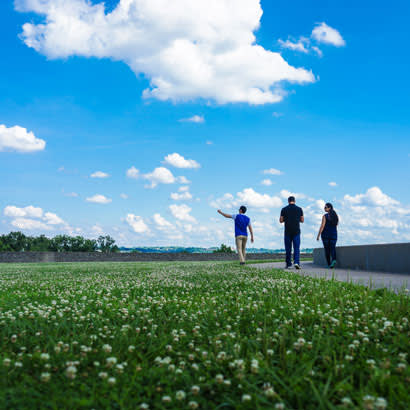
This Park and Recreation Month, as we celebrate the essential work park and recreation professionals do to help create communities that are vibrant, healthy and strong, we should also look to the future and ask ourselves, “what changes should be made in order for our society to be more equitable and just?” It has been well documented that the lack of access to parks and public green spaces, coupled with increased exposure to pollution and natural disasters in under-resourced communities, is the result of racist policies such as redlining. Therefore, one important way that we can start working to undo these injustices is to ensure that everyone has equitable access to safe and inclusive green spaces and that parks use green infrastructure to provide clean water and clean air, reduce flooding, and protect communities for the impacts of climate change.
While creating equitable access to “greener parks” is essential to creating just, resilient and healthy communities, it can be challenging to determine where to find resources to help begin making this change in local communities. Recognizing this need, NRPA has launched the following suite of Greener Parks for Health resources that offer a roadmap for securing the necessary support and investments to advance greener parks.
The field of parks and recreation cannot realize the vision for a nation of greener parks alone. The first step to building support for this effort is clear and compelling communication. The Greener Parks for Health Communications Toolkit provides evidence and values-based messaging to build community and leadership support, including one-pagers that provide facts and statistics on the environmental, health, economic and social impacts of greener parks.
Once you have a solid foundation of understanding, the next step is to use that support to lower barriers and increase funding for greener parks. The Greener Parks for Health Policy Action Framework highlights new and existing policies and funding mechanisms at the federal, state and local levels that have the potential to remove barriers, incentivize, and fund greener parks while building equity and increasing resilience.
Policy change doesn’t happen on its own, it takes committed advocates and consistent messaging. The Greener Parks for Health Advocacy Toolkit outlines guidance on how park and recreation professionals and other supporters can encourage local policymakers and community leaders to take actions that advance cross-sector solutions for implementing greener parks.
We hope these resources will help you in your effort to solve social, health and environmental challenges in your communities through greener parks. As you explore these resources, please sign up for our Greener Parks for Health listserv, where NRPA will share updates on the project and survey how these resources are being used in the field to build local support and catalyze systemic change.
Additional resources:
- COVID-19 Crisis Highlights Need for Greener Parks
- Nature Must Be Accessible to All
- Cities Address Racial Disparities in Access to Nature
Karl Schrass is NRPA’s Director of Conservation.

